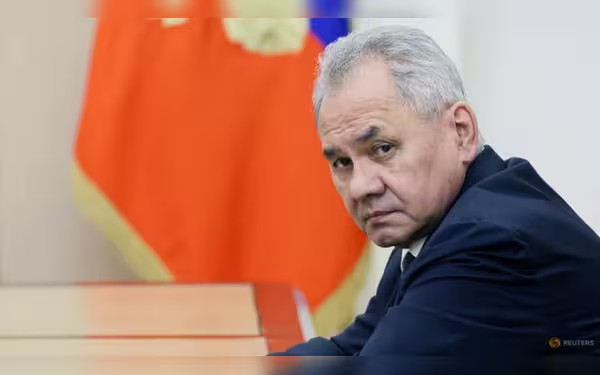Sunday, December 22, 2024 03:11 AM
Russia Strengthens Ties with Taliban, Urges US to Rebuild Afghanistan
- Russia seeks closer ties with Taliban leadership.
- US urged to assist in Afghanistan's reconstruction.
- Shoigu criticizes US for frozen Afghan assets.
 Image Credits: channelnewsasia
Image Credits: channelnewsasiaRussia aims to enhance ties with Taliban and urges US to aid in Afghanistan's reconstruction amid ongoing sanctions.
In recent developments, Russia has expressed a strong desire to enhance its ties with Afghanistan, particularly with the Taliban leadership. This comes in the wake of the United States' long military involvement in the region, which has left Afghanistan in a state of turmoil. On November 25, Sergei Shoigu, the secretary of Russia's Security Council, conveyed Moscow's intentions to help establish a lasting peace in Afghanistan during discussions with Taliban leaders in Kabul.
Shoigu, who previously served as Russia's defense minister, emphasized that the United States should take a leading role in the reconstruction of Afghanistan. He pointed out that the U.S. has a responsibility to assist in rebuilding the nation, given its extensive military presence over the past two decades. The Taliban leaders, in turn, sought Shoigu's assistance in alleviating the pressures of U.S. sanctions that have been imposed on the Afghan government.
During the talks, Shoigu highlighted Russia's readiness to engage in constructive political dialogue with Afghanistan. He stated, "Let me confirm our readiness to establish a constructive political dialogue between our countries and among the goals would be providing an impulse for the process of a settlement among Afghans." This statement reflects Russia's commitment to fostering stability in the region.
The backdrop of these discussions is significant. Following Russia's invasion of Ukraine in 2022, President Vladimir Putin has shifted his focus towards strengthening ties with Asian nations and other non-Western countries. This pivot is largely seen as a response to what the Kremlin describes as an economic blockade imposed by the U.S. and its European allies.
In a stern remark, Shoigu criticized the U.S. for its past actions, stating, "Again we have the theme of the United States, which robs everyone around them." He urged the U.S. to return Afghan assets that have been frozen, emphasizing that these funds rightfully belong to the Afghan people. He further asserted that the U.S. should be the primary investor in Afghanistan's reconstruction efforts.
Abdul Ghani Baradar, Afghanistan's Deputy Prime Minister for Economic Affairs, echoed Shoigu's sentiments, expressing the Taliban administration's need for Russian support to mitigate the impact of Western sanctions. He mentioned efforts to boost Afghan exports and attract foreign investment, despite the challenges posed by asset freezes and travel bans on Taliban leaders.
Russia's historical involvement in Afghanistan, particularly during the Soviet era, adds another layer to this relationship. The legacy of the Soviet Union's nine-year military engagement in Afghanistan still resonates today, as Russia seeks to establish a cooperative framework with the current Taliban government.
Moreover, Shoigu pointed out potential areas for economic collaboration, such as mineral extraction and infrastructure projects, including a trans-Afghan railway. These initiatives could pave the way for a more integrated and economically stable Afghanistan.
The evolving relationship between Russia and Afghanistan highlights the complexities of international diplomacy in a region marked by conflict and instability. As nations navigate their interests and responsibilities, the call for cooperation and support in rebuilding Afghanistan remains crucial. The future of Afghanistan hinges not only on its internal dynamics but also on the willingness of global powers to engage constructively and responsibly in its recovery.













